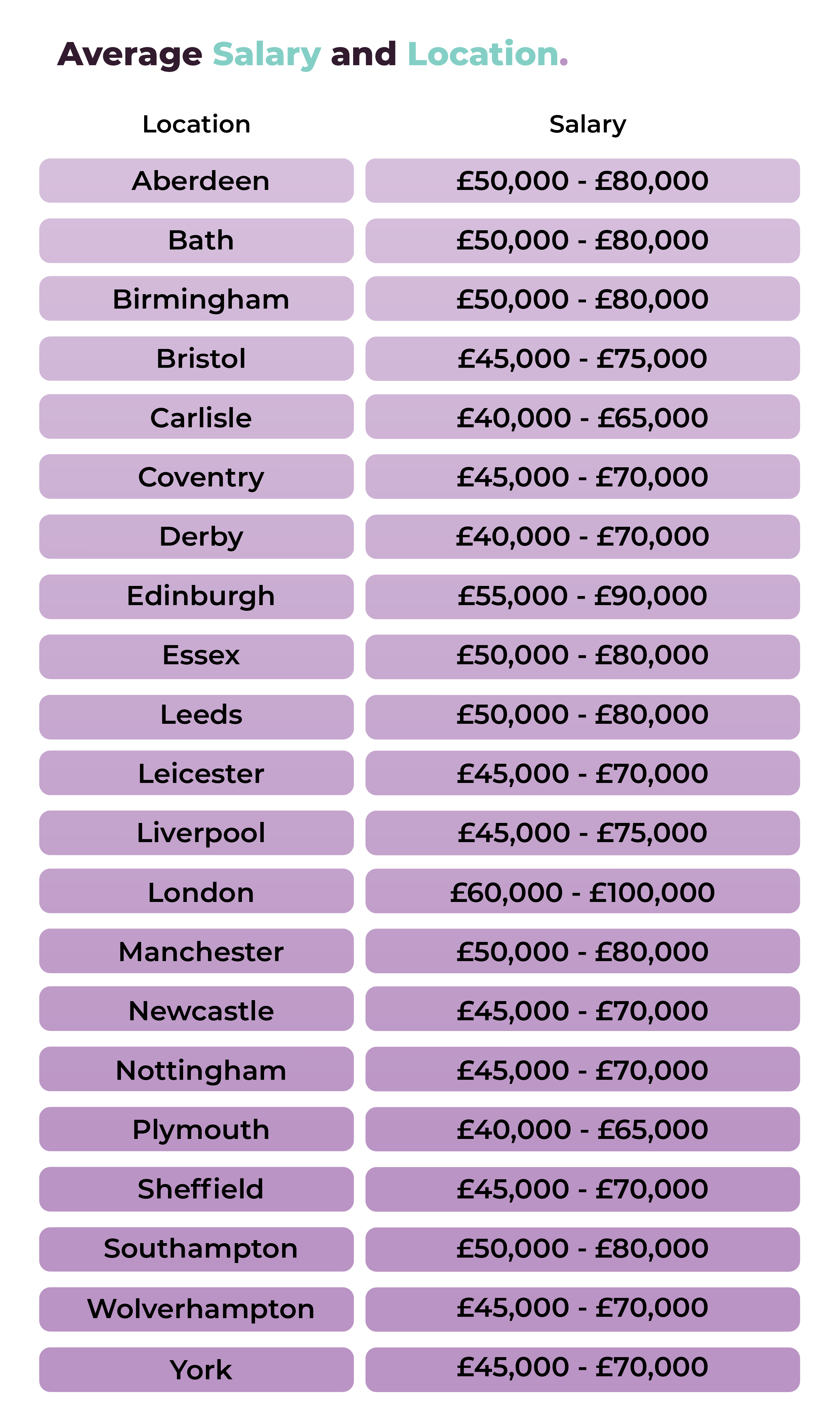What Is the Average Salary for a Head of Estates?
25 Apr, 20241-2 minutes
In this blog, you will learn:
- The average salary for a Head of Estates.
- What factors can affect a Head of Estates salary in the UK.
- How a Head of Estates can unlock their earning potential.
- Where the latest Head of Estates jobs are and how to apply for them.
Heads of Estate play a fundamental role within the property and asset management sector. Due to the demanding nature of their role and the specialised skill set required to succeed within the position, Heads of Estate can expect to take home a significant salary, however this can fluctuate depending on factors such as location, responsibilities and level of expertise.
For Heads of Estate aspiring to earn a higher income, there are a number of crucial ways to unlock their earning potential and in our latest blog, we’re discovering what factors can affect the average salary of a Head of Estates and how they can negotiate a higher salary!
What factors can affect the average salary of a Head of Estates in the UK?
There are a number of factors that can affect the range of a Head of Estates salary, including:
- The size and location of an employer.
- An individual’s level of experience.
- The responsibilities of the role.
- Whether the role is in the public or private sector.
The size and location of an employer
The size and location of an employer can affect the average salary for a Head of Estates in a number of ways.
Salaries often reflect the cost of living within a particular location. Regions with a higher cost of living, such as London where the average cost of living is around £1,400 more than the UK average, typically offer a higher salary in order to attract and retain professionals. Therefore a Head of Estates living and working in London, might expect to be paid more than a Head of Estates living and working in the North of England.
Here is a breakdown of the average salary for a Head of Estates across various locations across the UK.
It’s important to remember that these salary ranges can fluctuate based on factors such as the specific organisation, the responsibilities of the role and a professional's level of expertise.

The economic conditions of a region can also influence the salary of a Head of Estates role. Locations with a robust economy or higher demand for skilled professionals are more likely to offer a higher salary, in comparison to a region with a weaker economy.
For example, Manchester has experienced a significant increase in demand for both residential and commercial properties, influencing strong economic growth.
Edinburgh also has a resilient property market, driven by its fantastic tourism sector, making them both locations with a robust economy.
The size of a company can also affect how much a Head of Estates might earn. Larger companies often have larger budgets and therefore might be able to offer higher salaries to their team members.
For example, a Head of Estates working for a large multinational company, such as British Land which is one of the UK’s largest property development and investment companies, might expect to take home a salary ranging from £80,000 to £150,000 a year.
However, a Head of Estates working in a smaller, regional property management firm in a location such as Leeds, could earn a salary ranging from £50,000 to £80,000 per annum.
The main reason for this salary difference is that larger companies typically have an extensive property portfolio across numerous locations along with the necessity to complete complex property operations. Smaller companies on the other hand might have a limited property portfolio and a smaller budget to play with.
A Head of Estate’s level of experience
The level of experience and skill a Head of Estates brings to a position can determine the salary that they earn.
A Head of Estate’s expertise within property management practices, such as maintenance, leasing and budgeting is highly valued by an employer and can impact the salary they take home.
Within the property and asset management industry, Heads of Estates are frequently in high demand because of their specialised skill set.
For example, Heads of Estate are required to possess financial acumen in order to budget and forecast successfully for optimising estate investments. They must also have a comprehensive knowledge of the market in order to understand local and national property trends.
As a result of their in-demand skills and high level of experience, employers may need to offer higher salaries in order to attract and retain skilled professionals within a competitive job market.
A Head of Estates experience in identifying and mitigating the risks associated with property management, such as legal liabilities and compliance issues, can also affect an individual’s salary.
The case for a higher salary is supported by the fact that the ability to navigate regulatory environments and minimise the potential risks can be complex for a Head of Estates.
The responsibilities of the role
A Head of Estate’s responsibilities and day to day duties can determine the salary they will earn.
Individuals overseeing larger and more complex property portfolios at larger firms are typically more likely to receive a higher salary, due to the increased number of challenges associated with managing a higher amount of properties or assets.
While exact numbers can fluctuate based on factors such as location and experience, typically, they can expect to earn around £60,000 to £120,000 compared to a Head of Estates working for a smaller business, who might earn around £40,000 to £80,000.
For example, a Head of Estates in a larger company, might be responsible for developing and implementing long-term estate strategies, whereas the role of a Head of Estates in a smaller business might be to oversee day-to-day activity. It’s important to remember however that responsibilities can overlap between companies.
Heads of Estates are also frequently responsible for making strategic decisions related to leasing strategies, property acquisitions and capital improvements.
For example British Land has a history of making strategic property acquisitions to expand its portfolio and the company has acquired a significant stake in Broadgate, a retail complex situated in London, in order to strengthen its position in the commercial property market in this area.
The level of discretion and responsibility involved in making strategic decisions can impact a Head of Estate’s salary and mean they often command higher earnings.
Being a leader and developing a team of property professionals is a key responsibility of a Head of Estates that can determine a higher salary.
Individuals who demonstrate strong leadership skills and a track record of leading high-performing teams, may be able to negotiate a higher salary based on their contributions to the overall success of an organisation.
Public and private sector roles
Whether a Head of Estates works within the public or private sector can significantly affect their annual salary, due to differences in budget, organisational structure and the responsibilities of a professional.
A Head of Estates working in the private sector, for a company such as British Land, might expect to earn around £80,000 to £150,000. The reason for this high salary is that private sector companies operate within a competitive market and aim to attract experienced professionals to manage their extensive property portfolio. A high salary also reflects a company’s profitability and strategic importance in driving business growth.
A Head of Estates working within the public sector, for example within NHS Property Services, might earn around £50,000 to £90,000 per annum as public sector organisations are subject to public sector pay scales.
A Head of Estates working within a local council, generally earns around £45,000 to £80,000 per annum as local councils also base their salaries on public sector pay scales and roles tend to focus on service delivery and compliance.
How can a Head of Estates unlock their earning potential?
By demonstrating their value, expanding their expertise and maximising contributions to an organisation, a Head of Estates can work towards unlocking their earning potential and work towards a higher salary. Best practice for doing this is:
- Investing in Continuous Professional Development.
- Developing technological skills.
- Focussing on revenue generation.
- Quantifying contributions to an organisation.
- Leveraging professional relationships.
- Negotiating salaries thoughtfully.
Investing in Continuous Professional Development
A Head of Estates can unlock their earning potential and demonstrate their case for a higher salary by investing in their Continuous Professional Development (CPD).
Property and Asset Management recruitment specialist, Chris Wilkinson, says “By focussing on CPD, a Head of Estates is able to stay on top of industry trends, regulations and best practice, which can really help to improve their credibility as a property professional.”
For experienced and knowledgeable Heads of Estates at the top of their game, interim working is a great avenue to explore and a way to invest in career development. By pursuing a career in the interim market, a Head of Asset Management has the opportunity to explore well paid jobs within the public sector.
The fact that interim workers are expected to join a company and hit the ground running, with little need for additional training, provides them with a greater opportunity to take home a higher salary.
Pursuing qualifications, such as membership with the Royal Institute of Chartered Surveyors (MRICS - Member of the Royal Institution of Chartered Surveyors) that will enhance a Head of Estate’s expertise is a great way to showcase a commitment to Continuous Professional Development.
Participating in industry conferences, such as the RICS UK Annual Conference, and attending workshops, such as Property Week Masterclasses, is also an advised way to progress as a Head of Estates and display the traits and skills required for higher-level roles and compensation.
Developing technological skills
Developing technological skills within property and asset management can broaden a Head of Estate’s capabilities and increase their value as a property professional. Proptech Procurement Experts, Unissu suggest that utilising technology is an effective way to build better communication within the property sector.
Having important data surrounding property, market and tenant information, in one tool is said to allow professionals to react to change and plan ahead strategically. By doing so, Heads of Estate might be able to showcase their expertise and ability to adapt, standing them in good stead for negotiating a higher salary.
Gaining experience within emerging trends and other areas of the industry is also a great way to open up opportunities for career advancement and as a result, unlock the potential for a higher salary. For example sustainability continues to be a focus for the property sector and professionals are encouraged to increase their focus on sustainable building practices by practising methods such as the Building Research Establishment Environmental Assessment Method.
Technological skills are crucial for successfully supporting sustainability within the property sector and tools such as Building Management Systems must be operated successfully in order to monitor control building systems such as lighting and water usage and therefore reduce waste.
Focussing on revenue generation
Identifying opportunities to increase rental income, secure new tenants or enhance a property's amenities is a proactive way for a Head of Estates to focus on revenue generation.
By having a direct, positive impact on an organisation's financial performance, a Head of Estates is able to demonstrate that they possess a successful track record of driving revenue and maximising a property’s profitability.
As a result of this, professionals might be rewarded with higher compensation or at least be able to demonstrate they possess skills for negotiating a higher salary.
Quantifying contributions to an organisation
In order to strengthen a Head of Estate’s case for earning a higher salary, quantifying their contributions made to an organisation can highlight the impact they have had on the overall success of the business.
Property and Asset Management recruitment specialist, Joe O’Halloran, says “If a Head of Estates has utilised property management software which streamlined operations, improved data accuracy and saved a company X amount of money a year, the numbers linked to this achievement should be presented to decision-makers when negotiating a higher salary.”
Leveraging professional relationships
Leveraging professional relationships and networking with others in the property and asset management sector, is a vital way for Heads of Estates to increase their visibility.
Leveraging the professional relationships built from networking is a great way for Heads of Estates to discover new opportunities within the industry and unlock their earning potential.
For example, the RICS World Built Environment Forum is a global conference that takes place annually and unites professionals from the built environment sector to discuss issues and trends that are shaping their industry.
Such an event is a fantastic place for Heads of Estate to leverage their professional relationships, learn from others and hone the skills they need to command a higher salary.
Negotiating salaries thoughtfully
For a Head of Estates hoping to negotiate a higher salary, it would be prudent to conduct thorough research to determine salary benchmarks and market trends.
By conducting in-depth research, a Head of Estates is able to make an informed case when negotiating a higher salary.
Being able to articulate how their value proposition aligns with salary benchmarks is vital for Heads of Estates looking to unlock their earning potential.
Property jobs
If you’re searching for your next interim property job, why not take a look at the latest vacancies, or simply upload your CV to be notified when a relevant position becomes available.
Property recruitment services
As property recruitment specialists, we support local authorities and private sector businesses nationwide with their temporary, interim and permanent recruitment needs.
If you’re struggling to fill a vacancy, why not get in touch with our property specialists, Chris Wilkinson or Joe O’Halloran on 01772 954200 to see how we can help?
Who is Spencer Clarke Group?
Established in 2017, we’re a vibrant and progressive recruitment agency based in the heart of the North West.
We continually reimagine the recruitment process to challenge convention and defy expectations; from creating a better recruitment experience to remodelling employee engagement, we thrive off doing things differently and turning heads along the way.
We operate in two sectors:
In eleven specialisms:
Healthcare, Social Care & Nursing
Corporate Functions & Business Support




